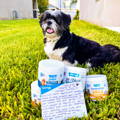when is a dog considered a senior?
Senior Dog Age: When Is a Dog Considered A Senior?
Jump to Section

Has your furry best friend reached their golden years? It can happen before we know it–one day they’re puppies, chewing through socks and squatting on puppy pads. Next thing you know they’re opting for a nice, long nap instead of playing all day. So when does the change happen?
Senior pets can have a wide range of needs, but the best way to support any pet is with love and patience. We’ll discuss when to know your pet has reached a distinguished “senior” status, what that means, and how best to maintain their ongoing health.
When is a dog considered a senior?
Small Breed Senior Dog Age
Medium Breed Senior Dog Age
Large Breed Senior Dog Age
Giant Breed Senior Dog Age

What to expect in newly senior dogs
Reduced mobility
Your dog used to have the zoomies when you got home from work. Now, they slowly canter up to say hello. What’s the deal? Well just like people, dogs will naturally slow down with age as energy levels begin a downward trajectory. The risk of arthritis and hip dysplasia will also increase with age, so keep an eye out for signs of pain or discomfort accompanied by reduced mobility.
Change in appetite
As humans, our tastes often change or narrow as we age–and it’s the same case for senior dogs! Your senior dog may no longer like the treats they once loved, or eat less than they used to. Smell and taste receptors will weaken as your dog grows older, which can influence their appetite and preference for certain foods.
Your senior dog will also have a lower MER (maintenance energy requirement) as their energy output drops and they slow down. That means they won’t need to eat as much to fuel their energy levels, since they aren’t playing as hard or as long as they once did and are becoming more sedentary.
Weight gain
Even if your senior dog is eating less than they did when they were younger, they’ll still be at higher risk for weight gain. A slower metabolism, decreased energy levels, and age-related thyroid or hormonal illnesses can all lead to geriatric weight gain in dogs.
Increased allergies
As your dog ages, their immune system may no longer function at its full potential–increasing the likelihood of worsening of allergic conditions. Symptoms of existing allergies may intensify, or your senior dog may develop a new allergy that causes unfamiliar allergy symptoms.
Changes to skin and coat
Is your senior dog losing more fur than usual? A thinning coat can be part of a dog’s natural aging process, making the coat look a bit less fluffy or vibrant with more dander than usual. Significant hair loss or bald patches should be evaluated by your vet to rule out other causes like hormone-related alopecia, external parasites, and secondary infections on the skin.
If your senior dog’s skin is dry, scaly, or itchier than normal, that could also be part of the aging process. Dermatitis (skin irritation) can be more prevalent in senior dogs who are at higher risk for allergies, vitamin deficiencies, and hormonal abnormalities.
Joint stiffness or pain
Arthritis is a disease that causes inflammation of the joints, leading to symptoms like pain, stiffness, and reduced mobility. According to the Arthritis Foundation, one in five dogs will get arthritis as they age. The condition can be more likely in certain dog breeds like German Shepherds and Labrador Retrievers, as well as senior dogs, obese dogs, and dogs who have a history of excessive physical exertion.
How to support senior dogs
Senior dogs need more support than younger or middle-aged dogs. Physical accommodations in their environment can help, and what you feed them will matter more than ever. If you’re thinking of adopting a senior dog or you have a dog who’s “getting up there,” take a look at these easy ways to support your senior pet:
- First and foremost, please consider senior dog adoption! Senior pets are often abandoned when they start having health issues, when their older pet parent passes away, or when their owner can no longer care for them. Younger dogs and puppies have a 60% adoption rate, while senior pets only have 25% adoption rate–the rest are part of the 1.5 million shelter dogs euthanized every year in the United States.
- Double down on allergy support. Your senior dog may be more prone to both new allergies and existing allergy symptoms, making daily or seasonal allergy supplements for dogs a smart investment for their long-term immune health.
- Talk to your veterinarian about potential dietary adjustments. If your dog is eating less, you’ll want to check that they’re still getting enough nutrients to keep them healthy. Whether it’s from their primary dog food or through dietary supplements, vitamins, minerals, and omega fatty acids are important for your senior dog.
- Make your home easier to navigate. Keep your dog’s cushioned bed where they can easily access it and away from cold or drafty areas which may aggravate arthritis pain. If you like to snuggle with your dog, consider building pet-safe steps to higher-to-reach areas like the couch or your bed.
- Invest in daily hip and joint support. This is especially important for dog breeds that are prone to arthritis and hip dysplasia, but can also keep joint and connective tissue healthy in all senior dogs so that they can play and walk more comfortably.
- Pamper them with regular grooming and skin support. Your dog’s coat and skin will become thinner as they age, but you can still keep their skin barrier and fur soft and healthy. Maintain a bath schedule every 2-3 months, and be sure to gently brush the fur to aid in natural shedding cycles and exfoliation. Support their skin from the inside out with a tasty supplement made with fish oil to give their skin and coat a glossy sheen.
- For senior dogs with sensitive stomachs, introduce probiotics. Supplementing their diet with probiotics can help with nausea, vomiting, and diarrhea that can occur from overeating or eating too many table scraps.
Join the Pack!

Sign up for exclusive deals, curated pet tips from veterinarians, and product launches!
Pet Parents are Also Reading...
March, 2022
Related Articles

DR. JOYA GRIFFIN, DVM, DACVD
Dr. Joya Griffin is an Ohio native and graduated from Cornell University College of Veterinary Medicine. She has a special interest in fungal and immune-mediated skin diseases as well as feline and equine dermatology. Dr. Joya always strives to care for her patients as if they are her own pets and loves building long-lasting relationships with their pet parents. Dr. Joya also stars in the Nat Geo WILD television series, “Pop Goes the Vet with Dr. Joya,” which highlights the challenging and mysterious cases she encounters in veterinary dermatology.























